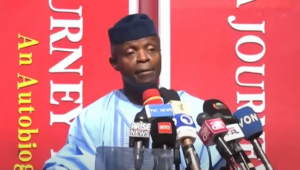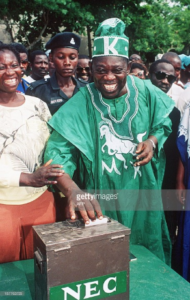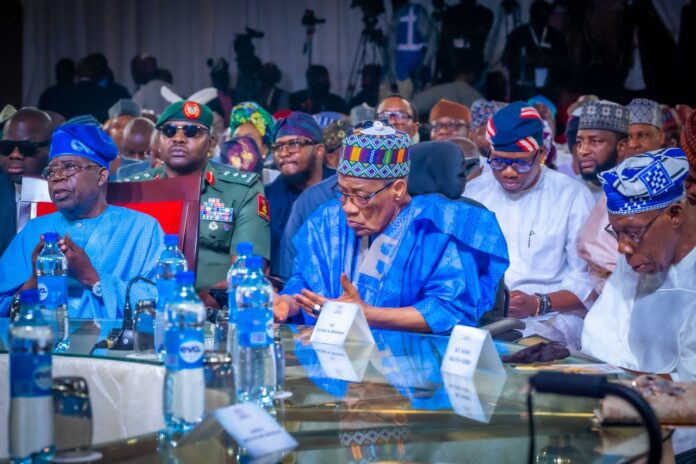By Joke Kujenya
THE CONTROVERSY surrounding Nigeria’s historic June 12, 1993, presidential election has taken a new turn, with former military president Ibrahim Badamasi Babangida conceding that Moshood Kashimawo Olawale (MKO) Abiola was the rightful winner.
This is coming thirty-two years after annulling what was widely regarded as Nigeria’s freest and fairest election, Babangida has publicly acknowledged Abiola’s victory for the first time in his newly released autobiography, A Journey in Service.
The 420-page memoir was launched in Abuja on Thursday, drawing a gathering of past and present Nigerian leaders, business magnates, and other dignitaries.
During the book review, former Vice President Yemi Osinbajo read excerpts where Babangida admitted that, despite his earlier stance, a closer examination of the facts and election results showed Abiola had won.

“Although I am on record to have stated after the election that Abiola may not have won, upon deeper reflection and close examination of all available facts, particularly the detailed election results published as an appendix to this book, there was no doubt that MKO Abiola won the June 12 election,” Babangida wrote.
The former military ruler outlined the figures, confirming that Abiola, the Social Democratic Party (SDP) candidate, polled 8,128,720 votes against the 5,848,247 secured by his opponent, Bashir Tofa of the National Republican Convention (NRC).
He also met the constitutional requirement of securing one-third of the votes in at least 28 states, including the Federal Capital Territory, Abuja.
Babangida, commonly referred to as IBB, described the annulment of the election as an “accident of history” and one of the most painful decisions of his life.
He expressed regret over the turmoil that followed, acknowledging that if given another chance, he would have handled it differently.
“As the leader of the military administration, I accept full responsibility for all decisions taken under my leadership. The annulment of the June 12 election happened under my watch. Mistakes, oversights, and missteps occurred in quick succession, but in all matters, we acted in extreme national interest so that Nigeria could survive,” he said during his address at the event.
The annulment triggered widespread protests and a political crisis that led to Babangida’s resignation in August 1993.
He handed power to an interim government led by Ernest Shonekan, but three months later, General Sani Abacha seized power in a coup.
Under Abacha’s rule, Abiola, who had declared himself the rightful president, was arrested and imprisoned.

He died under suspicious circumstances on July 7, 1998, while still in detention, a day before he was expected to be released.
For years, the annulment of the election remained a contentious issue in Nigerian politics, with pro-democracy groups, including the National Democratic Coalition (NADECO) and the Yoruba socio-political organisation Afenifere, demanding justice for Abiola and the Nigerian people.
In 2018, former President Muhammadu Buhari officially recognised Abiola as Nigeria’s democratically elected president and moved Democracy Day from May 29 to June 12 in his honour.
Babangida acknowledged this move in his memoir, stating, “I was pleased when the Buhari administration finally recognised Abiola as a former head of state of Nigeria.”
The book launch was attended by several high-profile figures, including former Presidents Olusegun Obasanjo, Goodluck Jonathan, Yakubu Gowon, and Abdulsalami Abubakar. Former Vice Presidents Atiku Abubakar and Namadi Sambo were also present, alongside President Bola Tinubu and Vice President Kashim Shettima.
Leading Nigerian business figures such as Aliko Dangote, Abdulsamad Rabiu, and Folorunsho Alakija were also in attendance.
However, former President Buhari, who was represented at the event, has a complex history with Babangida.
IBB played a role in the coup that brought Buhari to power in 1983 but later orchestrated the coup that removed him in 1985.
He described the memoir as an opportunity that provides him the most candid reflections on the events that shaped his presidency and Nigeria’s political history.
Babangida also noted that his admission on June 12 would be recorded as a pivotal moment in Nigeria’s history for a lasting impact on the country’s democracy.





